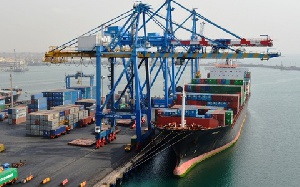The Private Enterprise Federation (PEF) has lauded the significant reduction in the number of days it takes for importers to clear their goods, brought on by the implementation of the Paperless Port system.
Chief Executive Officer (CEO) of the Private Enterprise Foundation (PEF), Nana Osei Bonsu, told the B&FT during a programme organised by PEF in Accra to assess the impact of some reforms introduced in the tax administration, registration of businesses, and the ports that the system has brought about significant changes, though some issues require further attention to make the system more efficient.
He said the system, among others: “Has helped reduced the amount of time spent clearing goods at the country’s ports.”
He, however, called on government and management of the ports to address the challenges of non-compliance and down time.
“We want to see some efficiency in the system to allow the private sector to be able to do what they need to do,” he said.
Down time occurs when the system or network is slow and leads to a build-up of queue. Another thing causing unnecessary delays and interfering in the smooth operations of the paperless port is non-compliance on the part of importers.
Some importers intentionally misclassify their goods—a situation that will require restart of the entire process when detected by authorities.
This, the Public Relations Officer of Tema Port, Customs Division, Ms. Dzinunya Mawuli advised importers to desist it from it if the paperless port system will achieve the purpose for which it was introduced, namely, trade facilitation.
“The paperless was brought to facilitate trade. But trade cannot be facilitated when importers are non-compliant. The system is such that once you make a mistake somewhere, say in declaration, the whole process must start again and that can delay the process. So we want the importers to be complaint so that trade can be facilitated,” she said in an interview with the B&FT.
Other concerns raised at the forum bothered on unnecessary delays in business registration and the continuous existence of middle-men popularly referred to as ‘goro boys’ at the Registrar General’s Department (RGD).
The PEF findings said progress on integrating core institutions such as the Ghana Revenue Authority, SSNIT, and Accra Metropolitan Assembly to facilitate online business registration remains slow as applicants must still visit them separately despite assurances that all three agencies will be located within the office of the RGD by end of 2018.
On tax reforms, the findings again identified some lapses in the Total Revenue Integrated Processing Systems (TRIPS), which is a new tax collection system introduced in 2012, as users have reported that the system is unable to correct some errors, failures in tax credit inputs, wrong user specifications, inability to capture advanced payments and occasional loss of data.
Again, reporting and receipts also fail to capture the different types of transactions and this makes auditing, account reconciliation and statistical analysis problematic.
Business News of Friday, 31 May 2019
Source: thebftonline.com

















